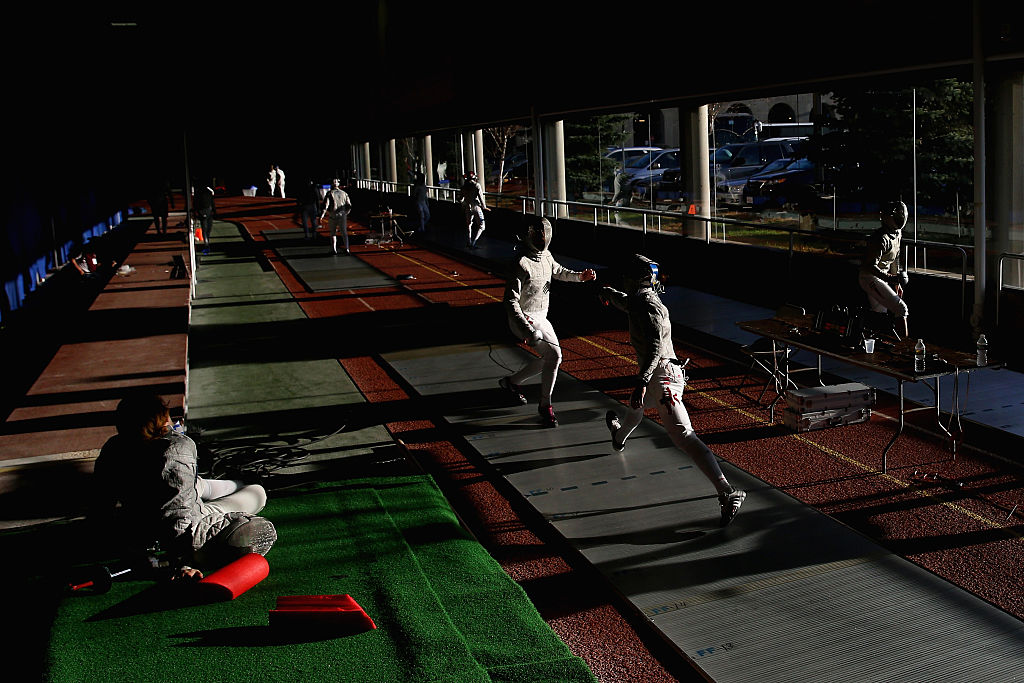I lost my coach a couple of weeks ago. His name was Gamal Mahmoud and he grew up in Alexandria and he came here to teach fencing, and referee fencing, and share some wisdom with schmoes like me. He was 67 years old, and now I have nobody left to serve me dessert.
I should explain. I am, or was, an aging épée hack. (I am currently in negotiation with my left quadriceps tendon as to the tense of the verb.) I began fencing in college, quit for two decades, and then picked it up again when I turned 40. That same year, I became father to a daughter and it suddenly seemed important to me to become slightly less of a couch-bound gastropod.
In college, because we were a club team and therefore usually undermanned, I competed in both foil and épée, so that’s what I tried to do when I came back. One of the major differences between the weapons is that foil is ruled by a set of rules regarding “right of way.” Both fencers attack each other. Both fencers hit each other. Both lights go on. The referee then makes something up, explains it in French, awards the point, and then one of the fencers complains in their native tongue, which occasionally is American Teenager. In épée, however, in almost every case, if you hit your opponent, you get the point. No muss. No fuss. If you both hit, you both score. (As you age, double hits become your friend.) Eventually, I got tired of foil’s infernal reliance on goddamn parliamentary procedure. (I decided I was too old to argue with any teenagers except my own.) So I gravitated exclusively to épée, in which the world made sense.
My first épée coach went back to Finland. This was something of a barrier to my progress as individual lessons are essential. I wandered coach-less for a spell and then, one day, a very large, smiling Egyptian entered my life. Gamal Mahmoud worked with me once or twice a week. Much of the lessons were grinding. Footwork up and down the strip. Parry and riposte, all eight parries, ripostes off all of them, up and down the strip. Putting together combination attacks, up and down the strip.
Counterparries. Beat attacks. Prise de fer, French for “taking the steel,” an action I hated because I could not get the hang of it. When I held the blade, my lunge was too slow. When I lunged quickly, I’d lose control of the opponent’s blade and walk into an easy counterattack. Nothing made me feel like more of a rookie than trying to execute a prise de fer. Every time I tried it, I heard the desperate voice of Roy (Tin Cup) McEvoy in my head, echoing around inside my mask: “My god, my swing feels like an unfolded lawn chair.”
I should pause here and mention that, as far as physical activity goes, I am not the most patient person. At moments of extreme athletic failure, I’d place myself somewhere between volatile and Krakatoa. I am a lifelong bat-kicker, sand wedge-tosser, and a basketball wall-slammer. Consequently, after several bungled attempts at executing the prise de fer, my response generally was to fume away inside my mask and jam the blade of my practice épée into the floor. I would then turn around and see Gamal shaking enormously with laughter. Once he saw me join in, he’d say, “OK, now we do dessert.”
Dessert was always the end of the lesson. We would go up and down the strip with me backing up and making a circular action around his hand and hitting him on the wrist. For épée fencers, especially short ones, like me, hand and wrist touches crank the orgasmatron up to 11. (Foot touches are said to have similar effect, but a short fencer who attempts a foot touch against a taller opponent often takes one in the head. This can be very discouraging.) I can still remember almost every one I’ve ever landed in competition. And I can remember great runs of them as I ended every lesson. I never ended a lesson unhappy. Gamal had figured that out long before I did.
Gamal was born in Alexandria in 1954. At odd moments at tournaments, or at practice, after lessons, he would tell me of how he’d go down to the seashore and watch the fishermen, or of how history was all around him when he grew up—temples and citadels and Pompey’s pillar. He talked about the great lost library and the ancient lighthouse as though they’d closed a week earlier. He took a degree in agricultural engineering and fenced for the Egyptian national team. He learned to coach under Michel Perrin in Paris and, after two stints coaching the Egyptian team, he came to the United States in 2001. He coached at clubs and universities all around Boston, finally ending up at Harvard, where he coached the épée side on a team that won the 2006 NCAA championship.
While I love the sport, and have made wonderful friends along the way, I have to admit that fencing has more than its share of pretentious twits, grandiose poseurs, and all-around arrogant dickheads. Therefore, when I say that nobody in the fencing universe didn’t love Gamal, I am really saying something remarkable. And that was true of his entire family; his wife, Hanan, is a nationally respected referee, a thankless trade that their daughter, Taysir, also has taken up. Their son, Yassir, whom I’ve known since he was a six-year old who liked to pretend he was a sumo wrestler, was a nationally ranked fencer and is now a coach himself. Whenever the whole clan showed up at a tournament, any self-importance melted away and the sport became a game again.
I haven’t picked up an épée in anger for almost a decade, my second-longest hiatus from the sport since the fall of 1971. Over those nine years, in order, I’ve blown out my right patella tendon, had my gallbladder removed, gotten hit by a car, and, most recently, blown out my left quadriceps tendon. Recuperation has been my primary physical activity. But, as I begin physical therapy for my latest orthopedic calamity, I do so determined to get back on the strip this fall. I learned this from a huge and smiling Egyptian who blessed the world in his passage through it—in life and in fencing, and even in these lost and drifting days, there is always time for dessert.






